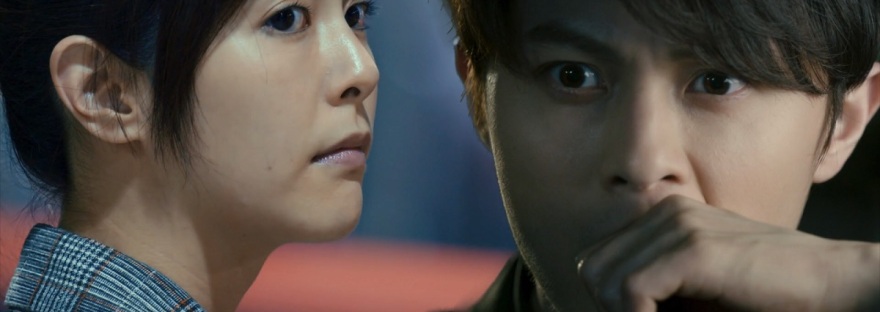
Oh Amensalism (覆活, lit. “Resurrection”), how I wish you were more!
Amensalism is a 2020 Taiwanese drama starring Prince Chiu as Cheng You Kuan and Lorene Ren as Bi Ke Wei, two star-crossed lovers. When You Kuan was young, he fell ill and died for a moment. In that moment when his heart stopped beating, he made a deal: if he gave a person’s name, he could exchange his life for their own. Their lives would forever be tied; for every day he lived, that person would live one day less, but he would be alive. You Kuan named his biggest elementary school rival: Bi Ke Wei.
That same night, Bi Ke Wei’s parents rushed down winding mountain roads. She had a dangerously high fever and they were racing to get her to the hospital. But they got into a car accident and both parents died, leaving Ke Wei the only survivor. The news and police labeled the accident a single car accident, but Ke Wei remembered seeing another car on the scene. For the past nineteen years, she’s been searching for that car.
You Kuan came out of that accident with problems of his own. He has vivid dreams of people who will die, but is always powerless to stop them. His father was the first person he dreamed of. His father disappeared shortly after his illness. No one believes his dreams, and instead You Kuan has been diagnosed with a myriad of mental illnesses.
When You Kuan and Ke Wei meet by chance as adults, they are immediately drawn to each other. She’s the only person who believes in his crazy dreams, but their relationship gets more complicated when he realizes who she is and what he owes her.
Also in our mix of characters is Xu Ming Fei (Eleven Yao), a celebrity-turned-CEO who employs You Kuan as a bodyguard, and Li Yao Qing (Andy Wu), Ming Fei’s workplace rival who is Ke Wei’s close friend. At first, it seems like they are getting the classic second lead, romantic rival treatment, but they both prove to be both more and less than that.
The actual plot and story of Amensalism are rather intriguing, though the first half of the show feels very different from the second half. The first half feels like an episodic, “crime stopper” (or in this case, tragedy stopper) show with a mildly supernatural element. The second half seems to completely forget about the first half and instead focuses only on our core set of characters and a mystery from the past. I didn’t really mind the switch in focus since I found the mystery interesting, but I also watched the show as it aired. The sudden change might feel more jarring if you watch multiple episodes at once.
There are also a lot of open questions around the supernatural elements that are left unanswered, perhaps because the show is pretty short at only 13 episodes and doesn’t really have time to explore more. Maybe the point is that the supernatural element doesn’t really matter and the characters can’t let their fear of it control their lives?
It’s always interesting to look back and think about how “amensalism” applies to the relationships in the show. According to dictionary.com, amensalism is “a relationship … in which the individuals of one species adversely affect those of the other and are unaffected themselves.”
You Kuan very obviously thinks that he has an amensalistic relationship with Ke Wei, in which he is the benefactor, being able to live his life, while Ke Wei suffers. He wrestles with that guilt for most of the show. But soon it becomes clear that maybe the amensalistic relationship between them is the other way around. You Kuan is constantly suffering because of this guilt, while Ke Wei is completely oblivious to the hidden connection between them and goes about her life just fine.
There are also plenty of other relationships that could be viewed as amensalistic in the show. Another obvious one is the one between the real culprit in Ke Wei’s accident and Ke Wei. Ke Wei has spent the past nineteen years suffering, while the culprit is able to go about their own life like nothing is wrong.
Amensalism has these interesting relationships and plotlines going on, and has some very beautifully shot scenes, but they weren’t enough to make up for the wholly mediocre lead acting. Lorene Ren is not the strongest dramatic actress, but I thought she was fine. Prince Chiu, on the other hand, did not have the acting strength to make You Kuan a compelling or sympathetic character. Sometimes I can handle bad acting for a good plot or cute chemistry, but in this case, the show is very centered around You Kuan as a character. So much of the story is his story and his struggle. You Kuan needed to carry the show, but there’s something about Prince’s expressions and line delivery that never quite felt grave or compelling enough. It’s a shame because You Kuan is supposed to be a very nuanced and complex character.
I wouldn’t say all the acting is bad, because Yen Yi Wen, who portrays You Kuan’s mother, is a powerhouse actress who really carries her scenes. I’m glad that she really had a chance to shine in this show. You Kuan’s mother is highly complex and flawed. She’s the one who refused to believe You Kuan and insisted he must be mentally ill rather than face the ugly truth that her husband might be dead, to the point of being abusive toward him. She makes some bad choices. But Yen Yi Wen makes her compelling rather than annoying.
Amensalism‘s biggest saving grace is that it’s relatively short at 13 episodes and low commitment. The episodes feel short and fly by, so you can start it and drop it (or not drop it) and not feel too bad.



its a good drama
LikeLike